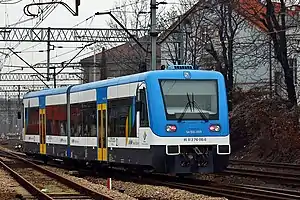Kolzam RegioVan
Kolzam RegioVan – a series of railcars produced in Poland, produced by Kolzam in Racibórz in 2003–2005 and by Fablok in Chrzanów in between 2011 and 2012. Kolzam jointly produced: two single units (SA107 – 211M type) and 10 double units (SA109 – 212M type), the eleventh railcar was produced by Fablok. There had not been any triple units produced.[1]
| Kolzam RegioVan | |
|---|---|
 SA109-005 of Koleje Śląskie | |
| Manufacturer | Kolzam, Fablok |
| Number built | 13 |
| Specifications | |
| Width | 2900 mm |
| Height | 3800 mm |
| Maximum speed | 120 km/h (75 mph) |
| Weight | Mini 23.3 t (22.9 long tons; 25.7 short tons) Midi 45 t (44 long tons; 50 short tons) Maxi 60 t (59 long tons; 66 short tons) |
History
Origin
Since the 1990s the PKP Group owned 6 railcars produced by Kolzam and 6 by ZNTK Poznań.
The PKP in the 1990s planned to receive the 16 ordered Pendolinos,[2] 50 EU11/EU43 from Bombardier Transportation Polska and a few hundred railcars for local connections. The order for the Pendolinos was cancelled in 2000 after the control by the Supreme Audit Office. All the orders were cancelled due to the financial situation PKP was in and in 2002 all of the delivered locomotives were sold to the Italian passenger transportation company Ferrovie dello Stato Italiane.
The order for the railcars never happened. But both Kolzam and ZNTK Poznań had drawn up plans and began a full structural project to create the railcar, and built the Kolzam 208M which has never been used.[3]
By the end of 2000 after the restructure[4] of the financing of the PKP for regional transportation, which created the Przewozy Regionalne which allowed the company to use finances for rolling stock. Which meant the company chose to order one, two and three unit railcars.[5]
Together with Kolzam ZNTK Poznań built the ZNTK Poznań Regio Tramp and Pesa with the Pesa 214M.[6]
Construction


The RegioVan is a one level, partly low-floor railcar for regional passenger service on less busy, mostly non-electrified railway lines. Produced in single and double units. The triple unit although being a project did not become realised.
In contrast to the previous designs of the Kolzam SN81 and SA104, the RegioVans have a modular lightweight body structure with a low floor in the entrance area. The height of the floor in the lower level is 575–600 mm and in the partly high level with steps and a ramp the height is 1090 mm.[8]
The units have double slide doors on both sides with a width of 1300 mm, located in the low floor area. Under each door there is a sliding step for easy boarding and access to the vehicle.
Both the 211M unit, the 212M one-axle unit (18MNb) and the (31ANb) are a one-axle unit. The planned three-axle unit, was to have had a third unit. The drive unit had an integrated engine with a power transmission and reverse shuttle which was placed under the floor in the power-pack engine system.
The units are equipped with standard safety automation equipment: automatic train braking and Radio-Stop.[9]
Versions
| Type | Name | Number of units | Axle formation |
Service weight |
Length | Number and power of engines | Number of seated places |
Number of places |
Number of units |
|---|---|---|---|---|---|---|---|---|---|
| 211M | Mini | 1 | A'1' | 23,3 t | 14 645 mm | 1 × 190 kW | 42 / 39 | 84 | 2 |
| 212M | Midi | 2 | A'1'+1'A' | 45 t | 26 630 mm | 2 × 190 kW | 62+11 / 64+9 | 180 | 11 |
| 210M | Maxi | 3 | A'1'+1'1'+1'A' | 60 t | 38 350 mm | 2 × 275 – 315 kW | 114 | 270 | 0 |
References
- "Kolzam". Inforail. Retrieved 18 December 2014.
- "PKP and Pendolino". RMF 24. Retrieved 18 December 2014.
- "Financial Restructure of the PKP". Rynek Kolejowy. Retrieved 18 December 2014.
- "Commercialisation of the PKP Group". ISAP. Retrieved 18 December 2014.
- "The effectiveness of the use of the new railcar" (PDF). Inforail. Retrieved 18 December 2014.
- "Photograph of the Pesa 214M". Phototrans. Retrieved 18 December 2014.
- "Kolzam has problems". Gazeta. Retrieved 18 December 2014.
- "Certificates". Swiadectwa. Retrieved 18 December 2014.
- "The Right To Use the 221M". Swiadectwa. Retrieved 18 December 2014.